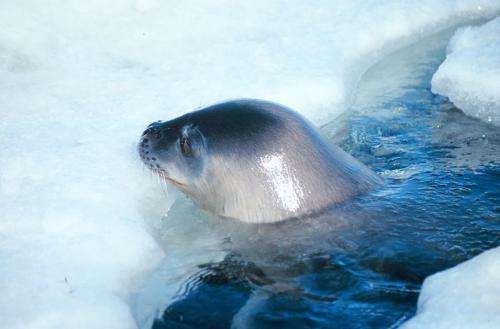May 13, 2013 report
Study finds Weddell seals have most developed brains at birth of any mammal

(Phys.org) —A trio of researchers working for the National Museum of Natural History and the Smithsonian Environmental Research Center has found that Weddell seal pups have proportionally, the largest brains at birth of any known mammal. They have published the results of their study in the journal Marine Mammal Science.
Prior research has shown that Weddell seal pups face a daunting task—they must learn to navigate beneath Antarctic sea ice, alone, as early as just six weeks old—that's when their mother's stop looking out for, and feeding them. Because of that, the research team suspected they likely are born with an advanced brain. To find out, they traveled to Antarctica and collected several seal pups (and some adults) that had died of natural causes. The heads of the dead seals, which were frozen of course, were severed and shipped back to a Smithsonian lab in the U.S. for testing. There the brains were removed and measured. The team also measured cranium size.
An analysis of their measurements showed that the Weddell seal pups had brains that on average were 70 percent as large as adults. This despite their relatively small size overall—at birth they have just 6 to 7 percent of the body mass of an adult. The large initial brain size is proportionally the largest ever seen for a mammal.
Scientists have found over the years that animals born into hostile environments tend to have larger brains at birth to help them survive. Zebras and wildebeest, for example, must be able to run with the herd just hours after being born—their relatively mature brains at birth help them to not only run, but respond in appropriate ways when predators appear. Likewise Weddell seal pups must be able to undertake what few other mammals are willing to dare, regardless of age—swim long distances under stretches of sea ice. Doing so is dangerous because there is always the risk that a seal won't be able to find a hole in the ice or an air pocket in time to prevent drowning.
The researchers theorize that the need for increased brain power is also related to the three dimensional nature of underwater existence, noting that some animals that live in trees also have large brains at birth. They note also that large brains in pups comes at a cost—mothers nursing their hungry pups lose more body mass doing so than any other known mammal. The pups, the researchers found, require 30 to 50 grams of glucose per day to survive, all of it coming from their mother's milk—28 grams of it is consumed by the brain.
More information: Eisert, R., Potter, C. W. and Oftedal, O. T. (2013), Brain size in neonatal and adult Weddell seals: Costs and consequences of having a large brain. Marine Mammal Science. doi: 10.1111/mms.12033
Abstract
Little is known about the ontogeny of brain size in pinnipeds despite potential functional implications of brain substrate (glucose, oxygen) requirements for diving, fasting, growth, and lactation strategies. We measured brain mass (brM) and cranial capacity (CC) in newborn and adult Weddell seals. Neonatal Weddell seals had brM that represented ~70% of adult brM. Weddell seals have the largest neonatal brain, proportional to adult brain, reported for any mammal to date, which is remarkable considering the relatively small size of Weddell seal pups at birth (6%–7% of maternal body mass) compared to neonates of other highly precocial mammals. Provision of sufficient glucose to maintain the large, well-developed brain of the neonatal Weddell seal has a nontrivial metabolic cost to both pup and mother. We therefore hypothesize that this phenomenon must have functional significance, such as allowing pups to acquire complex under-ice navigation skills during the period of maternal attendance.
© 2013 Phys.org



















